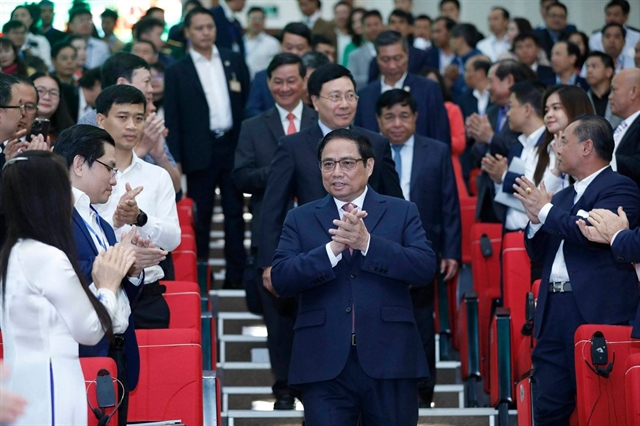PM Chính told the conference that the region should put people and businesses at the centre of development.

Prime Minister Pham Minh Chinh set out breakthrough steps for the inclusive, comprehensive and sustainable development of the Central Highlands while chairing a conference in Da Lat City, Lam Dong Province, on November 20.
The conference was held to launch the Government’s action plan materialising the Politburo’s Resolution No. 23-NQ/TW dated October 6, 2022 on orientations for socio-economic development, national defence and security in the Central Highlands by 2030 with a vision towards 2045.
The PM pointed out that the region, comprising five provinces of Kon Tum, Gia Lai, Dak Lak, Dak Nong and Lam Dong, has yet to fully tapped its potential, opportunities and competitive edge.
PM Chinh said: "It is necessary to promote the development of the Central Highlands following the general development strategy of the whole country."
The PM said the development of the Central Highlands must be self-reliant, using internal and external resources.
Chinh told the conference that the region should put people and businesses at the centre of development. The development must be inclusive, comprehensive and sustainable, narrowing the gap between rich and poor, ensuring social security, and leaving no one behind. In production and business, it is necessary to innovate technology, diversify products, and diversify markets and supply chains.
Chinh directed ministries, branches and localities to develop plans to implement the Government's direction to improve institutions and develop specific mechanisms and policies to submit for piloting in the region.
Regarding investment promotion, Chinh said it must be planned out with the different potentials, outstanding opportunities, and competitive advantages of the Central Highlands in mind. Localities must soon perfect and stabilise policies and mechanisms to attract investments suitably and effectively.
The PM used the occasion to call on investors, enterprises and development partners to maintain their confidence, promote the spirit of mutually beneficial cooperation, and continue accompanying Viet Nam in general and the Central Highlands in particular.
He also urged the localities to push ahead with public investment disbursement, and the implementation of national target programmes, and support businesses in terms of capital and administrative procedures.
Minister of Planning and Investment Nguyen Chi Dung said the Resolution No.23-NQ/TW will provide new impetus to the region's development, to "turn the Central Highlands into a fast and sustainable development region."
Dung said the development would be based on a green and circular economy boosted by its rich regional cultural identity. The region is attractive to domestic and international tourists and has a highly efficient agricultural economy thanks to several large-scale agricultural production areas.
The minister said the action plan has set out 20 specific targets for 2030, including average growth of 7-7.5 per cent, GRDP per capita of VND130 million (US$5,652) per year, the multidimensional poverty rate decreasing by 1-1.5 per cent per year, and a forest coverage rate of more than 47 per cent.
The action plan also supplements mechanisms and policies on the development of the Central Highlands, allowing resources to be mobilised for important projects to boost economic, cultural and social development, and protect natural resources and the environment.
At the conference, the leader of the Ministry of Transport said under the action plan, nine key transport infrastructure projects will be completed by 2030. These routes including Quy Nhon – Pleiku, Khanh Hoa – Buon Ma Thuot, Gia Nghia – Chon Thanh, Tan Phu – Bao Loc, Bao Loc – Lien Khuong, the expanding and upgrading of Lien Khuong, Pleiku and Buon Ma Thuot airports.
To attract more investment, Deputy Minister Le Anh Tuan said: "It is necessary to deploy expressways in the master plan, connecting the Central Highlands with neighbouring areas and seaports and airports," adding it also met the goals of Resolution No. 23-NQ/TW of the Politburo.
Attending the conference, Alain Cany, president of the European Chamber of Commerce in Viet Nam (EuroCham), said tourism, agriculture, and renewable energy were the three sectors that European enterprises are interested in.
As EuroCham has committed to supporting the development of Viet Nam's tourism industry, he praised Resolution 23.
He said EuroCham would ask the leaders of the Central Highlands provinces to join EuroCham and the Tourism and Hospitality Subcommittee to sign a Memorandum of Understanding on cooperation in tourism development, adding: "By strategically combining its resources, EuroCham will be able to accelerate the recovery of Viet Nam's tourism industry and enhance the reputation of the Central Highlands."
He said the region has about 5.5 million hectares of agricultural land, which produced many world-famous products such as coffee, pepper, avocado, lemon, and passion fruit.
Alain Cany announced that many European companies are investing in renewable energy in the Central Highlands. He gave an example that Mainstream Renewable Power acquired an 80 per cent stake in D&T Group to develop three solar projects, the largest European renewable energy project in Viet Nam.
However, he also said an investment corridor is needed to attract more foreign investment into the Central Highlands renewable energy industry, along with a clear legal mechanism to attract capital.
The Central Highlands provinces have a crucial strategic position in terms of politics, economy, society, environment, national defence, security and foreign affairs.
At the junction of the Viet Nam, Laos and Cambodia border and adjacent to the central coast and southeast regions, there are many potentials and opportunities.
At the conference, PM Chinh and representatives from ministries, agencies and localities witnessed the handover of cooperation agreements on sustainable development in the Central Highlands between the Ministry of Planning and Investment, and the region, and development partners, along with memoranda of understanding and investment licences worth more than US$5 billion and VND25 trillion (over $1 billion) for the construction of industrial parks and urban centres, infrastructure works and to develop high-tech agriculture and pharmaceutical materials.
Prior to the conference, he visited a photo exhibition featuring the land and people of the Central Highalnds. — VNS





